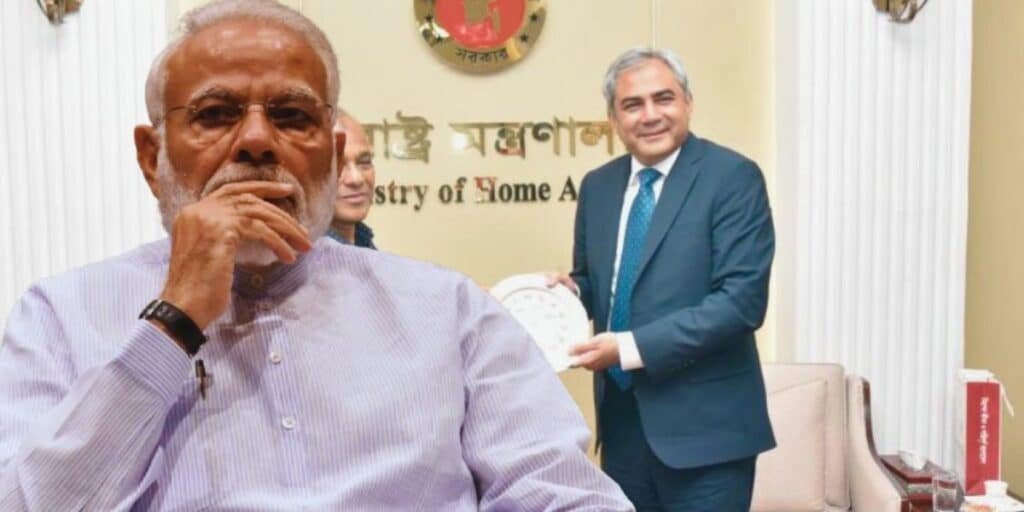Webdesk: India seems to be on edge as Bangladesh strengthens ties with Pakistan, with recent diplomatic exchanges signalling a renewed phase of cooperation following the formation of the interim government in Dhaka.
Following the ouster of former Prime Minister Sheikh Hasina, Dhaka’s diplomatic posture has changed, with China emerging as a key partner through financial support and political engagement.
Meanwhile, India’s influence appears to be waning, as public sentiment in Bangladesh turns critical of New Delhi’s role in sheltering Hasina and imposing trade restrictions.
Both Pakistan and Bangladesh have moved to restore long-strained ties due to the new administration.
In a major diplomatic breakthrough, Pakistan and Bangladesh have agreed in principle to grant visa-free entry to holders of diplomatic and official passports. @MohsinnaqviC42 @PakinBangladesh @ChiefAdviserGoB pic.twitter.com/VrzU3Ucs4J
— Pakistan Diplomacy News (@pakdiplomacy) July 23, 2025
A key outcome of this warming of ties was announced after a high-level meeting in Dhaka between Pakistan’s Interior Minister Mohsin Naqvi and Bangladesh’s Home Minister Lieutenant General (retd) Jahangir Alam Chowdhury.
Both parties accepted that diplomatic and official passport holders will travel between them visa-free. Such a development would also raise eyebrows in India, having security implications and in the context of the region as a whole.
The ministers also explored plans to launch exchange programmes between their police academies, with the goal of enhancing professional skills and technical capabilities.
Bangladesh’s Home Minister expressed gratitude to Minister Naqvi for the offer of training support and described the visit as a key step forward in strengthening bilateral relations
They spoke about potential joint counter-terrorist operations and exchange programmes between their police training. Chowdhury called the discussions a positive move towards enhancing bilateral collaboration and welcomed the proposal by Pakistan of training Bangladesh officers.
In line with this, Pakistan has formed a joint committee led by its Interior Secretary Khurram Agha to deepen engagement with Bangladesh. A Bangladeshi team is expected to visit Islamabad soon to inspect Pakistan’s Safe City Project and National Police Academy.
However, the visa waiver for Pakistani officials may not be viewed positively in India, as the Indian media reports suggest.
The fact that New Delhi is uneasy about visa-free travel between Dhaka and Islamabad also demonstrates a mentality that is more of controlling than collaborating. Instead of accepting that better relations with its neighbours are underway, India has fallen into suspicion, a response that goes to underscore its sense of unease with its waning power in South Asia.
India portraying all diplomatic advantages gained by Pakistan not in terms of diplomacy and being uncomfortable with it is a clear sign of a recalcitrant stand towards multipolar participation in South Asia.
The offer of police assistance and cooperation by Pakistan to Bangladesh is beneficial; however, India perceives it in the context of competition as opposed to regional development.
The old regional policy of New Delhi is facing pressure. Bangladesh’s decision to build closer ties with Pakistan reflects a broader shift. It also underscores the growing success of Pakistan’s foreign policy and regional diplomacy.
Read more: Bangladesh’s foreign policy tilts toward China as ties with India fray






